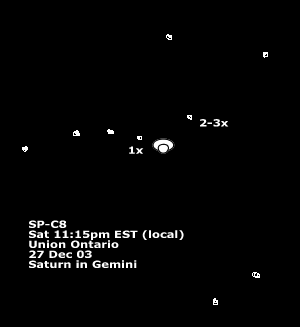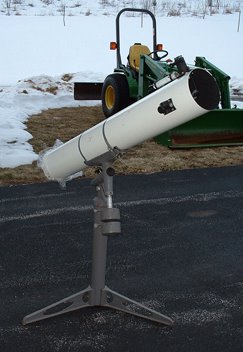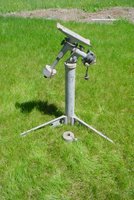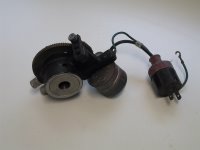snowflakes reflecting
moonbeans flashing blue and white
like the stars above
Tuesday, December 30, 2003
Saturday, December 27, 2003
using the reflector (Union)
location: Union, Ontario
5:00pm - 6:45pm
Used Al's telescope, a Edscorp 6" reflector (on an equatorial mount). It has an eyepiece that looks about 50 to 60 power. Nicely collimated—my first attempt (thanks to the notes in The Backyard Astronomer's Guide)! First used it on the Moon (first quarter), then Venus, gibbous, and finally The Pleiades. The Moon resolved very nicely (despite heat waves), easy to focus. The Pleiades look really good in a wide field. Fired up my 'scope.
Even though the reflector has a smaller objective, it produces a comparable image to the cat (the Celestron 8" Schmidt Cassegrain Telescope on Vixen Super Polaris mount).
Looked at Mars, gibbous, and Venus (fairly low in the horizon). Mars is so much smaller now, cannot resolve any detail per se. It is half or a third the apparent size compared to the summer.
Lots of dew.
§
11:00pm - 12:00am
Frost. Heaters worked great. As the eyepiece warmed up, Saturn became incredibly bright and crisp. I could see different cloud bands, the shadow of the rings on the planet, and the Cassini division between the rings. Everyone (Mom, Donna, and Steve) enjoyed it.
Saturn is in Gemini at 6h43m RA and 22°23' Dec. Drew map of image in cat. This is my first time attempting to determine if I'm seeing the moons of the planet...

Orion Nebula. Could see the four little stars in the middle!
[ed: Messier 45 (M45), Messier 42 (M42).]
5:00pm - 6:45pm
Used Al's telescope, a Edscorp 6" reflector (on an equatorial mount). It has an eyepiece that looks about 50 to 60 power. Nicely collimated—my first attempt (thanks to the notes in The Backyard Astronomer's Guide)! First used it on the Moon (first quarter), then Venus, gibbous, and finally The Pleiades. The Moon resolved very nicely (despite heat waves), easy to focus. The Pleiades look really good in a wide field. Fired up my 'scope.
Even though the reflector has a smaller objective, it produces a comparable image to the cat (the Celestron 8" Schmidt Cassegrain Telescope on Vixen Super Polaris mount).
Looked at Mars, gibbous, and Venus (fairly low in the horizon). Mars is so much smaller now, cannot resolve any detail per se. It is half or a third the apparent size compared to the summer.
Lots of dew.
§
11:00pm - 12:00am
Frost. Heaters worked great. As the eyepiece warmed up, Saturn became incredibly bright and crisp. I could see different cloud bands, the shadow of the rings on the planet, and the Cassini division between the rings. Everyone (Mom, Donna, and Steve) enjoyed it.
Saturn is in Gemini at 6h43m RA and 22°23' Dec. Drew map of image in cat. This is my first time attempting to determine if I'm seeing the moons of the planet...

Orion Nebula. Could see the four little stars in the middle!
[ed: Messier 45 (M45), Messier 42 (M42).]
Labels:
collimation,
double stars,
friends and family,
Mars,
Messier,
Moon,
open clusters,
planets,
software,
Venus
Friday, December 26, 2003
Mom's telescope
Friend of my sister, Al, it seems, had an old telescope which he wasn't using. I gather my sister talked about some of our astronomy stuff so Al "gave" it to my Mom. Cool!
It did not come with any notes or documentation so I had to do some digging on the net to learn about this thing... It is apparently circa 1974!

type: reflector / Newtonian
make: Edmund Scientific Co.
model: 6"
sighting finder scope: none included
viewing equipment: 1¼" shaft, rack & pinion focuser
mount type: equatorial with 2 counterweights, 1" shaft
mount accessories: Conrac single-axis "clock drive" motor
tripod: iron (heavy!), 3" pillar
eyepiece(s):
technical info:

On the tripod, Edmund Scientific Co. is embossed in the metal everywhere. The code C2058 shows on the base cap. And on the equatorial mount, B-2088 or B-2089 shows.
Here's a close-up photo (also from Astromart Classifieds) of the clock drive.

The A/C-powered, synchronous clock drive motor has the following printing:
The 'scope didn't work correctly at first. I realised it needed to be aligned or collimated. I was able to do this easily!
It did not come with any notes or documentation so I had to do some digging on the net to learn about this thing... It is apparently circa 1974!

type: reflector / Newtonian
make: Edmund Scientific Co.
model: 6"
sighting finder scope: none included
viewing equipment: 1¼" shaft, rack & pinion focuser
mount type: equatorial with 2 counterweights, 1" shaft
mount accessories: Conrac single-axis "clock drive" motor
tripod: iron (heavy!), 3" pillar
eyepiece(s):
- unmarked, wide field, looks old
- Meade 18mm, orthoscopic
- Meade 4mm, orthoscopic
technical info:
- focal length: 1210mm (the main tube is 47-5/8” long)
- aperture: 6"
- focal ratio: f/8
- minimum / maximum magnification: 22x / 300x

On the tripod, Edmund Scientific Co. is embossed in the metal everywhere. The code C2058 shows on the base cap. And on the equatorial mount, B-2088 or B-2089 shows.
Here's a close-up photo (also from Astromart Classifieds) of the clock drive.

The A/C-powered, synchronous clock drive motor has the following printing:
- CRAMER DIVISION, Old Saybrook, Conn.
- Type 117, P27MABA3, 18A1XA08A-L, date 6 72, RPM 1/15 V115, CY60 W2.7
- CONRAC CORP
The 'scope didn't work correctly at first. I realised it needed to be aligned or collimated. I was able to do this easily!
Labels:
Edmund Scientific,
equipment,
friends and family
Thursday, December 25, 2003
Seeing and Believing
My sister gave me another astronomy-themed book. It's Seeing and Believing by Richard Panek from Fourth Estate publishing.

It's about the development of the telescope! Cool!
§
I enjoyed this book. I learned about the history of the telescope and the sequence of events leading up to the understanding of the workings of the solar system and the Universe. I particularly liked learning about Galileo and how he kicked off the use of the telescope for observing the "fixed" stars. It also gave me a better appreciation of radio astronomy.

It's about the development of the telescope! Cool!
§
I enjoyed this book. I learned about the history of the telescope and the sequence of events leading up to the understanding of the workings of the solar system and the Universe. I particularly liked learning about Galileo and how he kicked off the use of the telescope for observing the "fixed" stars. It also gave me a better appreciation of radio astronomy.
Labels:
books,
friends and family
Monday, December 08, 2003
consulting
Diane asked me if I'd like to help her friend David in the purchase of a telescope. He wanted to get a nice 'scope for his girlfriend whose a very accomplished photographer. We exchanged a couple of phone calls and many emails on types of 'scopes, costs, resellers, other supplies, books, etc. I also talked my few attempts at astrophotography.
Stumbled across a web site by a guy who's used and reviewed over 70 'scopes!
Stumbled across a web site by a guy who's used and reviewed over 70 'scopes!
Labels:
education,
equipment,
friends and family
Subscribe to:
Posts (Atom)

